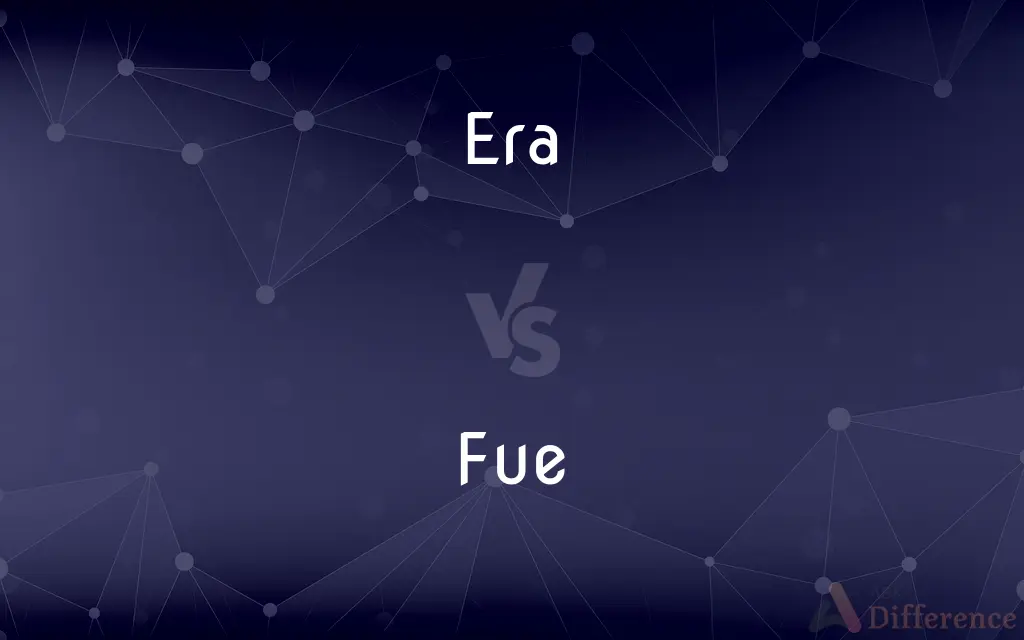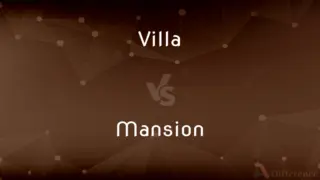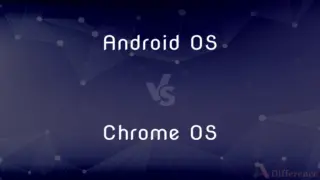Era vs. Fue — What's the Difference?
By Tayyaba Rehman — Updated on October 28, 2023
"Era" is an English noun referring to a distinct period in history. "Fue" is the third person singular past tense of "ser" in Spanish, meaning "was." While "Era" designates time periods, "Fue" indicates a past state or identity in Spanish.

Difference Between Era and Fue
Table of Contents
ADVERTISEMENT
Key Differences
The term "Era" in English is a concept that helps segment history into distinguishable time frames. These segments, defined by significant events, advancements, or changes, allow for a more structured understanding of the past. For instance, the Renaissance era is identified by its burst of art, culture, and scientific discoveries.
Contrastingly, "Fue" has its roots in the Spanish language. Specifically, it's the past tense of the verb "ser," one of the two Spanish verbs that mean "to be." "Fue" denotes a past state or inherent characteristic of a subject. Its application is in sentences where something or someone "was" in a particular state or had a particular identity.
When examining "Era," its primary utility is in the realms of history, geology, or any field where time segmentation is essential. You wouldn't use "Era" to describe an action or state, but rather to categorize a period defined by specific characteristics.
On the other hand, "Fue" has a more direct and personal application in daily Spanish communication. It describes past states or identities, giving context about what something or someone was. While "Era" is static in meaning across contexts, the meaning and usage of "Fue" might require a deeper understanding of Spanish grammar and nuances.
Comparison Chart
Language
English
Spanish
ADVERTISEMENT
Part of Speech
Noun
Verb (past tense form)
Meaning
A distinct period in history
Was (referring to inherent characteristics)
Usage
History, geology, time segmentation
Describing past states or identities
Example
The Renaissance era
Fue profesor (He was a teacher)
Compare with Definitions
Era
A specific period in time marked by particular features or events.
The digital era has transformed the way we live.
Fue
A way to specify a past profession or role.
Ella fue doctora. (She was a doctor.)
Era
A division in geologic time during which a series of rocks formed.
The Paleozoic era saw the development of marine life.
Fue
Past tense of "ser" indicating a previous state or characteristic.
Fue difícil. (It was difficult.)
Era
An extended span of time characterized by an individual, group, culture, or characteristic.
The era of classical music produced timeless masterpieces.
Fue
Used to describe inherent qualities or identities in the past.
Fue rey por muchos años. (He was king for many years.)
Era
An era is a span of time defined for the purposes of chronology or historiography, as in the regnal eras in the history of a given monarchy, a calendar era used for a given calendar, or the geological eras defined for the history of Earth. Comparable terms are epoch, age, period, saeculum, aeon (Greek aion) and Sanskrit yuga.
Fue
Denoting a past origin or material.
Fue de México. (It was from Mexico.)
Era
A period of time as reckoned from a specific date serving as the basis of its chronological system.
Fue
To indicate a past event's time or date.
Fue el jueves pasado. (It was last Thursday.)
Era
A period of time characterized by particular circumstances, events, or personages
The Colonial era of US history.
The Reagan era.
Fue
Fue (笛/ふえ) is the Japanese word for bamboo flute, and refers to a class of flutes native to Japan. Fue come in many varieties, but are generally high-pitched and made of a bamboo called shinobue.
Era
The longest division of geologic time, made up of one or more periods.
Era
A time period of indeterminate length, generally more than one year.
Era
(geology) A geochronologic unit of tens to hundreds of millions of years; a subdivision of an eon, and subdivided into periods.
Era
A fixed point of time, usually an epoch, from which a series of years is reckoned.
The foundation of Solomon's temple is conjectured by Ideler to have been an era.
Era
A period of time reckoned from some particular date or epoch; a succession of years dating from some important event; as, the era of Alexander; the era of Christ, or the Christian era (see under Christian).
The first century of our era.
Era
A period of time in which a new order of things prevails; a signal stage of history; an epoch.
Painting may truly be said to have opened the new era of culture.
Era
A period marked by distinctive character or reckoned from a fixed point or event
Era
A major division of geological time; an era is usually divided into two or more periods
Era
A system of chronology dating from a noteworthy event.
Historians often reference the post-war era.
Era
A long and distinct period in history with a particular feature or characteristic.
Dinosaurs ruled the earth during the Mesozoic era.
Common Curiosities
Is "Fue" used for temporary states in Spanish?
No, for temporary states, "estuvo," from the verb "estar," is used.
What does "Fue" mean in Spanish?
"Fue" is the past tense of "ser," meaning "was."
Is "Era" an English word?
Yes, "Era" is an English word referring to a specific period in history.
When do I use "Fue" in a sentence?
Use "Fue" when referring to a past state or inherent characteristic.
Can "Fue" be used for objects as well as people?
Yes, "Fue" can describe the past state or identity of both objects and people.
Is "Era" only related to history?
No, "Era" can also refer to periods in geology or other fields.
What's an example of an "Era" in history?
The Renaissance is an example of an era in history.
Can "Era" refer to future periods?
No, "Era" typically refers to past or current periods.
How is "Era" pronounced?
"Era" is pronounced as /ˈɪərə/ in American English.
In which tense is "Fue" used in Spanish?
"Fue" is used in the preterite (simple past) tense.
What's another word similar to "Era"?
"Epoch" is a word similar to "Era."
Is "Fue" the only past tense form for "ser"?
No, "ser" has other past tense forms like "fuimos" for "we were."
Can "Era" refer to a span of just a few years?
Yes, an era can be any length of time, depending on context.
How do I know when to use "ser" (like "Fue") versus "estar" in Spanish?
"Ser" (e.g., "Fue") is for inherent characteristics, while "estar" is for temporary states.
Can "Era" be used in scientific contexts?
Yes, "Era" can refer to divisions in geologic time.
Share Your Discovery

Previous Comparison
Cable vs. DSL
Next Comparison
Villa vs. MansionAuthor Spotlight
Written by
Tayyaba RehmanTayyaba Rehman is a distinguished writer, currently serving as a primary contributor to askdifference.com. As a researcher in semantics and etymology, Tayyaba's passion for the complexity of languages and their distinctions has found a perfect home on the platform. Tayyaba delves into the intricacies of language, distinguishing between commonly confused words and phrases, thereby providing clarity for readers worldwide.















































